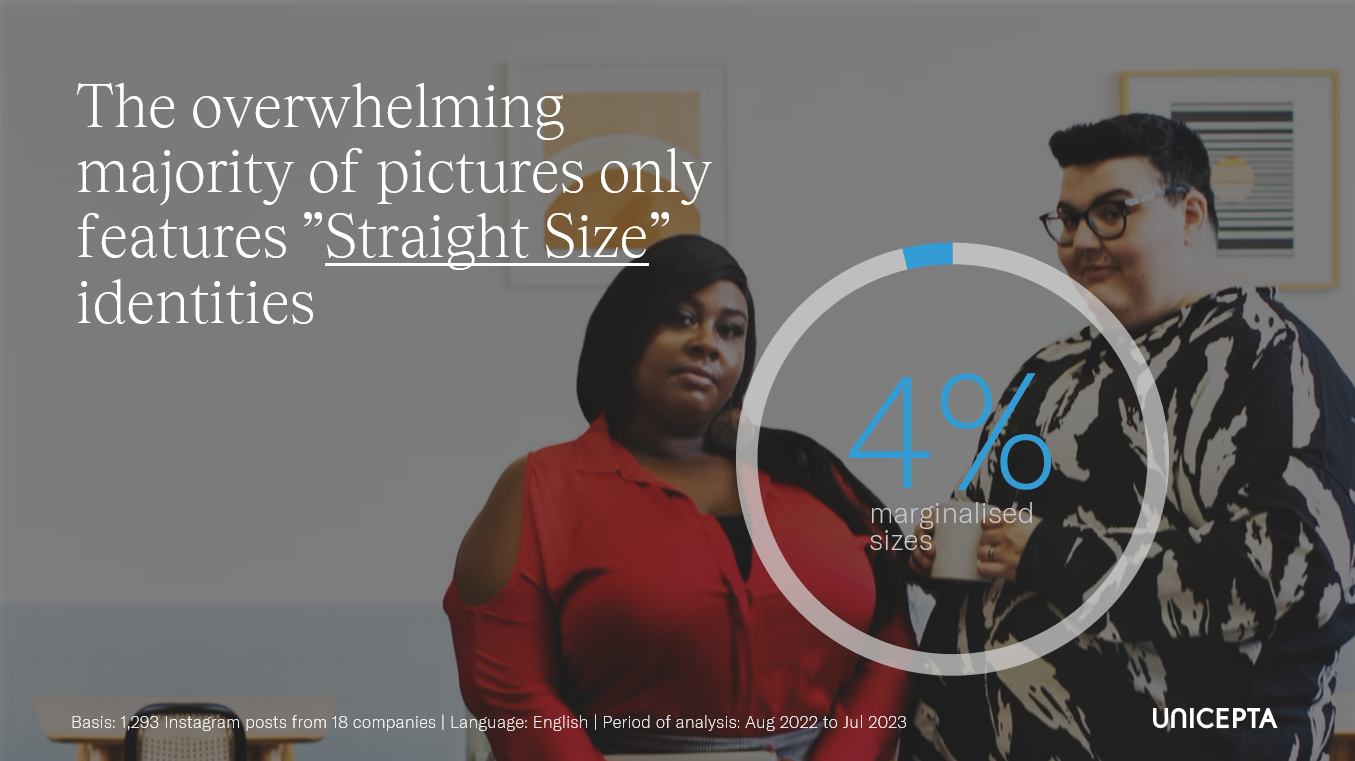People with disabilities are virtually sidelined on Instagram
In the much-cited mix of environmental, social and governance issues (ESG) in corporations and organizations that is being called for by the public, the focus is clearly on environmental and climate justice issues. In contrast, companies have a much harder time with the "S" in ESG, the social component, which is about plurality, diversity and the integration of marginalised social groups, among other things.
21.11.2023
This is shown by an analysis conducted by media intelligence expert UNICEPTA, which evaluated 18 different Instagram company profiles from 9 industries in the categories of ethnic characteristics / skin colour, body size, age, gender and physical disabilities. The representation of people with disabilities was particularly concerning. Only 1 per cent of the Instagram images analysed for the UNICEPTA study showed people with visible disabilities or medical conditions.
Diversity and inclusion have long since become decisive success factors for every organisation, regardless of image factors. As an important step towards more diversity and inclusion, the visualisation of marginalised groups and their realities within company-owned channels therefore seems only logical. With this in mind, the UNICEPTA analysts analysed the image-based social media channels on Instagram and specifically evaluated the levels and frequency at which different identities appear within a year among the leading international companies in their competitive environment. The sectors analysed were cosmetics, tourism, sporting goods/sportswear, household product manufacturers, food manufacturers, food retailers, financial service providers, technology and automotive manufacturers.
In terms of ethnic characteristics such as skin colour, a high degree of integration was already visible in some sectors. On average across all sectors, over 52 per cent of all images featured exclusively or at least partly people of colour. The manufacturer Nike even showed 62 per cent of images with black people in them. The automotive industry is at the bottom of the diversity ranking. 96 per cent of Volkswagen's Instagram content shows exclusively white people. At Ford, the proportion is still 74 per cent.

Hardly any visibility of people with disabilities or overweight
A look at the social media presence of people with disabilities reveals a particularly dramatic misrepresentation. Of around 1,800 Instagram images analysed for the UNICEPTA study, only 1 percent contained people with visible disabilities/medical conditions. A stark contrast to the actual number of people with visible disabilities in our society. According to the World Health Organisation, an estimated 16% of the world's population live with disabilities, some of which are significant (WHO, March 2023). As disability can go hand in hand with a lack of access to the outside world, access and representation in digital spaces are often particularly important for people with disabilities.
Here too, the sports sector has the highest proportion of images showing people with visible disabilities. Again, much of this content was posted by Nike and predominantly showed top athletes. Depictions of the daily lives of people with disabilities were virtually non-existent.
There were also a few visual mentions in the technology, financial services, cosmetics and tourism sectors. In contrast, there was no analysable content from the household goods, retail, food or automotive sectors. A weak picture that will continue to shape society's perception of people with disabilities.
People with body measurements outside of traditional beauty ideals also have a hard time on social media. In the UNICEPTA study, only 4 per cent of the people featured were overweight, the majority of whom were slightly overweight. Only two of the approximately 18,000 people analysed were severely or very severely overweight - both were female.
Building a strong community also helps to combat hate comments
Even if the findings of the study come as little surprise in many respects, they dramatically show how many opportunities for inclusive communication are still seemingly completely ignored, even by major corporations. Does the fear of losing control also play a role here? The high number of transphobic and fatphobic comments on social channels, for example, unfortunately speaks a very clear language. However, building a strong community - and this is only possible with a clear and consistent stance - makes it easier in the medium term to deal with this abusive criticism and hate speech and thus also minimise the damage to marginalised groups. Companies such as Nike or, in Germany, Deutsche Bahn, which often take a clear stance in favour of diversity, show that this is possible.
You can download the study for free here.
About UNICEPTA
UNICEPTA is a global provider of media and marketing intelligence solutions. With AI-driven technology and over 450 analytics and monitoring experts, UNICEPTA analyses globally available content from social, online, print, TV and broadcast media as well as numerous other data sources - in real-time and at any other desired time. The high-quality analyses and insights serve global companies and organizations as a basis for decisions in corporate management as well as in communication and marketing. UNICEPTA’s offices are located in Berlin, Cologne (headquarters), Krakow, London, Paris, Shanghai, São Paulo, Washington DC, and Zurich. In Germany, over 50% of all DAX-listed companies rely on UNICEPTA’s expertise.
Contact
UNICEPTA GmbH
Salierring 47-53
50677 Cologne
Christina Westerhorstmann
Phone: +49 173 9061 058
christina.westerhorstmann(at)unicepta.com